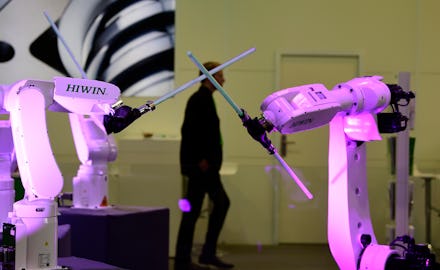Here's why robots are making income inequality even worse

The American working class is getting hammered and it seemingly isn't because immigrants are taking jobs — it's because robots, without families to feed or children to send to college, are cheap replacements for human workers. In fact, that's a major factor contributing to the growing financial gap between high- and low-income families, data suggests.
Just within the last half-decade, the gap between households in the top and bottom 20% of annual household incomes has widened dramatically, growing by $29,200 to $189,600 from 2010 to 2015, Bloomberg calculated, using United States Census Bureau data. Meanwhile, automation trends are only predicted to increase — Pricewaterhouse Coopers LLP found 38% of U.S. jobs are at risk for automation by 2030.
Are people prepared for the fast-approaching changes?
At least 65% of Americans said they expect jobs will generally be automated within the next 50 years, according to Pew Research Center, but most workers believe their job will be safe from automation. Despite that optimism, about one in 10 Americans said they do worry about losing their job to a robot, Pew found, with manual or physical laborers expressing the most concern.
Alas, these fears might not be unfounded: Research from the World Economic Forum has found automation could contribute to the loss of that 5.1 million jobs by 2020, as Mic has reported, with many of the lost jobs currently held by men.
Yet it is true that displaced workers will be able to find other jobs — which is one reason experts suggest the biggest danger posed by robots is not so much unemployment as widening income inequality. Here's why.
Why automation makes the rich richer
Automation has not triggered mass unemployment, despite concerns about increasingly-realistic innovations like driverless trucks and ATMs that can handle mortgages. But already, around the edges, robots are on the rise — creating cost savings that benefit corporations and Americans who run businesses. These benefits are increasingly going to a small group at the top.
In fact, the income gap between the super rich and middle class has also increased at a rapid clip — by $58,800 between 2010 and 2015, as Bloomberg reported. And within the middle class itself, the gap between upper and lower middle class grew by $9,000.
At the same time, affordable housing is getting harder and harder for workers to find near tech and production hubs, with skyrocketing costs of housing and commuting challenges in technology-based cities like San Francisco, Seattle, San Jose, California, and Austin, Texas. And wages have been stagnant for decades: Productivity levels rose by 80.4% between 1973 and 2011, but wages crept up by only 10.7%, the Guardian reports.
Which jobs are safe... for now
If you work in the creative arts, you may be most protected from the robot revolution: "Computers can't generally do creative things yet. If there's a job where you genuinely create something new all of the time, you're safe for the foreseeable future," Martin Ford, author of Rise of the Robots, told Mic in 2015. "But most people do relatively routine, formulaic work."
And, generally, if you work with people, such as an occupational therapist or a caretaker, your job probably won't be automated any time soon.
Similarly, though a robot could probably make a decent burger, automation is all about cost versus savings — and a robot chef would likely be more costly to keep on staff than a human chef paid $10 an hour, Fortune points out.
Other areas proving to be tough to automate? Jobs that require moving around in unpredictable environments, such as hotel housekeeping or heavy equipment operators. Those in management or who interact with customers on a personal basis could also be safe from a robot takeover. Health care work is more of a toss up: Some jobs are safe, but others could see automation.
In short, if you are concerned about your job, a career that requires serious people skills can be your safe haven. Until the day comes when robots have feelings and personalities, jobs that rely upon "soft" skills appear to be key.
Sign up for The Payoff — your weekly crash course on how to live your best financial life. Additionally, for all your burning money questions, check out Mic's credit, savings, career, investing and health care hubs for more information — that pays off.